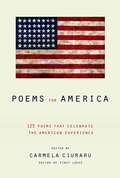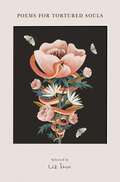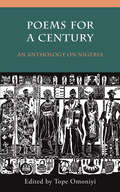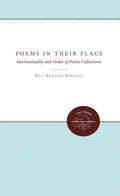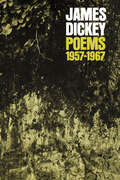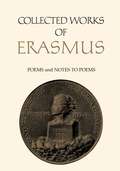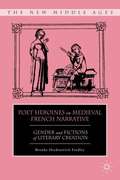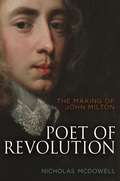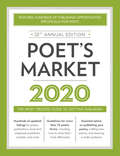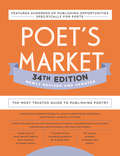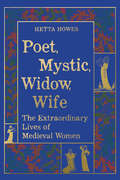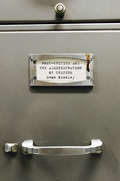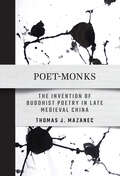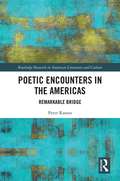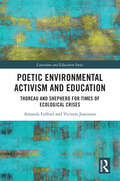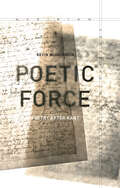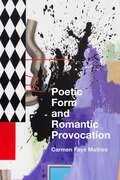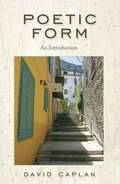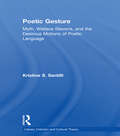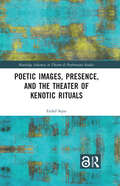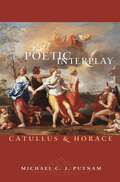- Table View
- List View
Poems for America
by Carmela CiuraruAn inspiring anthology that celebrates our nation with more than one hundred of the greatest poems ever written about the landscapes, institutions, and transforming events of America. This remarkable volume commemorates our country's struggles and triumphs with poems chronicling the American experience in all its vastness, from the late seventeenth century through the present day. Alongside poems about New York, Florida, and California are descriptions of railroads, amusement parks, hotels, and road trips; scenes of rural and western life; vivid descriptions of our grandest cities; and poems that illuminate the complexity of the most shameful chapters in U. S. history, such as slavery and the oppression of Native Americans. Taken together, these poems -- whether voices of celebration or dissent -- honor the astonishing and enduring spirit of our nation. Here are classics such as "The Battle Hymn of the Republic," "Crossing Brooklyn Ferry," and "Paul Revere's Ride"; works by American masters, including Emily Dickinson, Robert Frost, Wallace Stevens, Marianne Moore, Langston Hughes, and Elizabeth Bishop; and lesser-known gems by important American writers, such as Ernest Hemingway's "I Like Americans" and Henry David Thoreau's "Our Country. " Also featured are poems by contemporary talents, including Richard Wilbur, Philip Levine, Adrienne Rich, Yusef Komunyakaa, Rita Dove, and Sherman Alexie. A timeless volume that traces the history of the United States through verse, Poems for America is essential for poetry lovers and for anyone who appreciates the rich and fascinating story of our nation.
Poems for Tortured Souls
by Liz IsonSoothe your spirit with this emotional, romantic, must-have collection, an homage to some of the poets and writers who have inspired Taylor Swift. This collection of timeless poems is a beautiful introduction to the passionate words that have inspired artists and lyricists for generations. Discover poetry that overflows with folklore, love, heartbreak, revenge, and peace – the perfect balm for any tortured soul. Featuring poems by Edna St. Vincent Millay, Emily Dickinson, William Shakespeare, Elizabeth Barrett Browning, Lewis Carroll and more, this moody and melancholy anthology celebrates the English language&’s most famous poets, and the emotions that unite us. Warning: these poems might make you cry!
Poems for a Century: An Anthology on Nigeria
by Ifi Amadiume Tade Akin Aina Sumaila Umaisha Toyin Adewale-Gabriel Okinba Launko Afam Akeh Femi Oyebode Amatoritsero Ede Peter Akinlabi Tanure Ojaide Zainabu Jallo Richard Ali Ismail Bala Obi Nwakanma Adebayo Lamikanra Hope Eghagha Funso Aiyejina Jekwu Ozoemene Ogaga Ifowodo Chidi Anthony Opara Sulaiman Adebowale Kole Ade-Odutola Uzor Maxim Uzoatu E. E. Sule Akeem Lasisi Olajumoke Verissimo Cyril Obi Tolu Ogunlesi Omohan Ebhodaghe Tope Omoniyi John Pepper Clark Olu Oguibe Uche Nduka Remi Raji Molara A32 Prince Abiathar Zadok Molara Wood WoodIn 2010, billions of naira were spent to celebrate the 50th anniversary of Nigeria's independence since 1960. More naira are to be spent in 2014 to commemorate the centenary marking the nation's birth in 1914 from an amalgamation of diverse group of peoples, languages, cultures and expectations. As the conscience of the nation, writers are calling for a deeper introspection. A hundred years after unification, the most populous African nation has oscillated from being great to being fickle, from colony to independence and dependency, from peace to war to ungraceful insecurity, from military dictatorship to civilian oppression and profligacy and much more of the many contradictions of a complex national polity. In this special collection Poems for a Century: An Anthology on Nigeria, poets from different backgrounds, generations and persuasions explore what it means to be a citizen of this unique African country. Shifting from despair to hope, lamentation to happiness, condemnation to adoration and every gamut of sensibilities imaginable, the contributors reiterate the notion of engagement and the power of the written word to push for social change in their beloved nation. In fifty poems, Nigeria becomes the muse not just to raise questions about its past experiences and present contexts, but also to posit aspirations for a better nation.
Poems in Their Place: Intertextuality and Order of Poetic Collections
by Neil FraistatWith essays by 13 leading scholars, this collection establishes the grounds for a new kind of poetics that considers the poetry book itself -- the concept and the material fact -- as an object of interpretation. The authors argue that the decisions poets make about the presentation of their works play a meaningful role in the poetic process and therefore should figure as part of the reading experience.The common practice of approaching poems chronologically, as they are presented in anthologies or in posthumous editions, has been fostered by the long prevailing tendency of the New Criticism to treat each poem as self-contained. This volume urges the reader to reconsider the most fundamental ways that one reads, teaches, and inteprets poetry.Moving from classical to contemporary poetry, these essays develop a literary history and theory for such a poetics, at the same time providing a generous set of models for a related practical criticism. At the heart of this collection are such issues as order, arrangement, and intertextuality. Reading poems in their place helps to return them to their historical contexts because the book itself has had a particular place in its own culture and society.Originally published in 1987. A UNC Press Enduring Edition -- UNC Press Enduring Editions use the latest in digital technology to make available again books from our distinguished backlist that were previously out of print. These editions are published unaltered from the original, and are presented in affordable paperback formats, bringing readers both historical and cultural value.
Poems, 1957–1967: 1957-1967 (Wesleyan Poetry Series)
by James DickeyClassic poems from a famous American poet This volume represents, under one cover, the major work of the man whom critics and readers have designated the authentic poet of his American generation. For this collection, James Dickey has selected from his four published books all those poems that reflect his truest interests and his growth as an artist. He has added more than a score of new poems—in effect, a new book in themselves—that have not previously been published in volume form. Specifically, Poems 1957-1967 contains 15 of the 24 poems that were included in his first book, Into the Stone (1960); 25 of the 36 that made up Drowning With Others (1962); 22 of the 24 in Helmets (1964); the entire 22 in the National Book Award winner Buckdancer's Choice (1965); and, under the titles Sermon and Falling, the exciting new poems mentioned above. Seldom can the word "great" be used of the work of a contemporary in any art. But surely it applies to the poems of James Dickey.
Poems: Poems And Notes To Poems (Collected Works of Erasmus #85-86)
by Desiderius Erasmus Harry Vredeveld Clarence MillerThe final two volumes in the CWE contain an edition and translation of Erasmus's poetry. For Erasmus scholars this work affords the first opportunity to evaluate and analyse Erasmus' poems in English. And for those interested in Renaissance and Reformation poetry in general, these offer an intriguing look at the work of one of the towering figures of the period writing in a genre that was, for him, unusual. The annotations include a path-breaking commentary piece by Harry Vredeveld on Erasmus' most famous poem, `Poem on the Trouble of Old Age.' Another important feature is the appearance of the original Latin of each poem alongside the English translation. Volumes 85 and 86 of the Collected Works of Erasmus series – Two-volume set.
Poet Heroines In Medieval French Narrative
by Brooke Heidenreich FindleyExamining French literature from the medieval period, Findley revises our understanding of medieval literary composition as a largely masculine activity, suggesting instead that writing is seen in these texts as problematically gendered and often feminizing.
Poet of Revolution: The Making of John Milton
by Nicholas McDowellA groundbreaking biography of Milton’s formative years that provides a new account of the poet’s political radicalizationJohn Milton (1608–1674) has a unique claim on literary and intellectual history as the author of both Paradise Lost, the greatest narrative poem in English, and prose defences of the execution of Charles I that influenced the French and American revolutions. Tracing Milton’s literary, intellectual, and political development with unprecedented depth and understanding, Poet of Revolution is an unmatched biographical account of the formation of the mind that would go on to create Paradise Lost—but would first justify the killing of a king.Biographers of Milton have always struggled to explain how the young poet became a notorious defender of regicide and other radical ideas such as freedom of the press, religious toleration, and republicanism. In this groundbreaking intellectual biography of Milton’s formative years, Nicholas McDowell draws on recent archival discoveries to reconcile at last the poet and polemicist. He charts Milton’s development from his earliest days as a London schoolboy, through his university life and travels in Italy, to his emergence as a public writer during the English Civil War. At the same time, McDowell presents fresh, richly contextual readings of Milton’s best-known works from this period, including the “Nativity Ode,” “L’Allegro” and “Il Penseroso,” Comus, and “Lycidas.”Challenging biographers who claim that Milton was always a secret radical, Poet of Revolution shows how the events that provoked civil war in England combined with Milton’s astonishing programme of self-education to instil the beliefs that would shape not only his political prose but also his later epic masterpiece.
Poet's Journal (Amplify Core Knowledge Language Arts, Grade 5 #Unit 3)
by Amplify EducationNIMAC-sourced textbook
Poet's Journal: Grade 5 Unit 3 (CKLA #First Edition)
by Amplify Education Inc.POET'S JOURNAL GRADE 5 UNIT 3
Poet's Market 2020: The Most Trusted Guide for Publishing Poetry (Market #2020)
by Robert Lee BrewerThe Most Trusted Guide to Publishing Poetry! Want to get your poetry published? There's no better tool for making it happen than Poet's Market 2020, which includes hundreds of publishing opportunities specifically for poets, including listings for book and chapbook publishers, print and online poetry publications, contests, and more. These listings include contact information, submission preferences, insider tips on what specific editors want, and--when offered--payment information. In addition to the completely updated listings, the 33nd edition of Poet's Market offers articles devoted to the craft and business of poetry, including the art of finishing a poem, ways to promote your new book, habits of highly productive poets, and more.
Poet's Market 34th Edition: The Most Trusted Guide to Publishing Poetry
by edited by Robert Lee BrewerThe Most Trusted Guide to Publishing Poetry, fully revised and updatedWant to get your poetry published? There's no better tool for making it happen than Poet's Market, which includes hundreds of publishing opportunities specifically for poets, including listings for book and chapbook publishers, print and online poetry publications, contests, and more. These listings include contact information, submission preferences, insider tips on what specific editors want, and--when offered--payment information. In addition to the completely updated listings, the 34th edition of Poet's Market offers: • Hundreds of updated listings for poetry-related book publishers, publications, contests, and more • Insider tips on what specific editors want and how to submit poetry • Articles devoted to the craft and business of poetry, including how to track poetry submissions, perform poetry, and find more readers • 77 poetic forms, including guidelines for writing them • 101 poetry prompts to inspire new poetry
Poet, Mystic, Widow, Wife: The Extraordinary Lives of Medieval Women
by Hetta HowesAn invaluable reassessment of what we think we know about the daily lives of women in medieval Europe. Poet, Mystic, Widow, Wife charts the lives and times of four medieval women writers—Marie de France, a poet; Julian of Norwich, a mystic and anchoress; Christine de Pizan, a widow and court writer; and Margery Kempe, a no-good wife—who all bucked convention and forged their own paths. Largely forgotten by modern readers, these women have an astonishing amount to teach us about love, marriage, motherhood, friendship, and earning a living. Reading the words of these four writers, Hetta Howes engagingly reveals how everyday women lived, survived, and thrived in medieval times. Who did they marry and why? Did they ever have extramarital affairs? Could they earn money and become self-sufficient? Could they be leaders? What did they think about death—and what about life and their place in it? Poet, Mystic, Widow, Wife paints a vibrant portrait of these women, their world, and the ways they speak to us today.
Poet-Critics and the Administration of Culture
by Evan KindleyAfter the 1929 crash, Anglo-American poet-critics grappled with the task of legitimizing literature for public funding and consumption. Modernism, Evan Kindley shows, created a new form of labor for writers to perform and gave them unprecedented say over the administration of culture, with consequences for poetry’s role in society still felt today.
Poet-Monks: The Invention of Buddhist Poetry in Late Medieval China
by Thomas J. MazanecPoet-Monks focuses on the literary and religious practices of Buddhist poet-monks in Tang-dynasty China to propose an alternative historical arc of medieval Chinese poetry. Combining large-scale quantitative analysis with close readings of important literary texts, Thomas J. Mazanec describes how Buddhist poet-monks, who first appeared in the latter half of Tang-dynasty China, asserted a bold new vision of poetry that proclaimed the union of classical verse with Buddhist practices of repetition, incantation, and meditation.Mazanec traces the historical development of the poet-monk as a distinct actor in the Chinese literary world, arguing for the importance of religious practice in medieval literature. As they witnessed the collapse of the world around them, these monks wove together the frayed threads of their traditions to establish an elite-style Chinese Buddhist poetry. Poet-Monks shows that during the transformative period of the Tang-Song transition, Buddhist monks were at the forefront of poetic innovation.
Poetic Community
by Stephen VoycePoetic Community examines the relationship between poetry and community formation in the decades after the Second World War. In four detailed case studies (of Black Mountain College in North Carolina, the Caribbean Artists Movement in London, the Women's Liberation Movement at sites throughout the US, and the Toronto Research Group in Canada) the book documents and compares a diverse group of social models, small press networks, and cultural coalitions informing literary practice during the Cold War era.Drawing on a wealth of unpublished archival materials, Stephen Voyce offers new and insightful comparative analysis of poets such as John Cage, Charles Olson, Adrienne Rich, Kamau Brathwaite, and bpNichol. In contrast with prevailing critical tendencies that read mid-century poetry in terms of expressive modes of individualism, Poetic Community demonstrates that the most important literary innovations of the post-war period were the results of intensive collaboration and social action opposing the Cold War's ideological enclosures.
Poetic Encounters in the Americas: Remarkable Bridge (Routledge Research in American Literature and Culture)
by Peter RamosPoetic Encounters in the Americas: Remarkable Bridge examines the ways in which U.S. and Latin American modernist canons have been in cross-cultural, mutually enabling conversation, especially through the act of literary translation. Examining eighteen U.S. and Latin American poets, my book is one of the few works of criticism to present case studies in U.S. and Latin American poetries in dialogues that highlight the social life and imaginative encounters obtained through methodologies of translation and innovations in poetic technique.
Poetic Environmental Activism and Education: Thoreau and Shepherd for Times of Ecological Crises (Literature and Education)
by Amanda Fulford Victoria JamiesonThis book brings together the works of the nineteenth and twentieth century writers Henry David Thoreau and Anna Shepherd. Finding in their work a common approach of poetic forms of writing that enact kinds of environmental activism, the book re-positions them in the context of current environmental crises by offering an original resource for supporting poetic environmental activism in educational contexts.Bringing together scholarship from North America and Europe, the book draws on Thoreau and Shepherd’s literary and philosophical sources to support a conceptual understanding of education’s role in how we think about, understand, and tackle the climate crisis. Chapters trace the idea of poetic environmental activism in Thoreau and Shepherd, applying literary and environmental thought to educational practice and contexts. The book is timely in taking a scholarly approach that explores educational engagements with climate change and focuses on education for environmental sustainability.Advocating for engagement with the climate emergency through the lens of poetic environmental activism, this volume will appeal to postgraduate students, researchers, and scholars involved with sustainability education, philosophy of education, poetic inquiry, and literary theory for environmental action.
Poetic Force: Poetry After Kant
by Kevin MclaughlinThis book argues that the theory of force elaborated in Immanuel Kant's aesthetics (and in particular, his theorization of the dynamic sublime) is of decisive importance to poetry in the nineteenth century and to the connection between poetry and philosophy over the last two centuries. Inspired by his deep engagement with the critical theory of Walter Benjamin, who especially developed this Kantian strain of thinking, Kevin McLaughlin uses this theory of force to illuminate the work of three of the most influential nineteenth-century writers in their respective national traditions: Friedrich Hölderlin, Charles Baudelaire, and Matthew Arnold. The result is a fine elucidation of Kantian theory and a fresh account of poetic language and its aesthetic, ethical, and political possibilities.
Poetic Form and Romantic Provocation
by Carmen Faye MathesCritics have long understood the development of Romantic aesthetics as a turning point in the history of literary theory, a turn that is responsible for theories of mind and body that continue to inform our understandings of subjectivity and embodiment today. Yet the question of what aesthetic experience can "do" grates against the fact that much Romantic writing represents subjects as not actually in charge of the feelings they feel, the dreams they dream, or the actions they take. In response to this dilemma, Poetic Form and Romantic Provocation argues that being moved contrary to one's will is itself an aesthetic phenomenon explored by Romantic poets whose experiments with poetic form and genre provoke unanticipated feelings through verse. By analyzing how Romantic poets intervene, affectively and aesthetically, in readerly expectations of form and genre, Mathes shows how provocations disrupt and invite, disturb and compel—interrupting or suspending or retreating in ways that ask readers to orient themselves, materially and socially, in relation to literary experiences that are at once virtual and embodied. Examining the formal tactics of Charlotte Smith, William Wordsworth, Samuel Taylor Coleridge, John Keats, and Percy Bysshe Shelley, alongside their reactions to historical events such as Toussaint Louverture's revolt and the Peterloo Massacre, Mathes reveals that an aesthetics of radical openness is central to the development of literary theory and criticism in Romantic Britain.
Poetic Form: An Introduction
by David CaplanWriting exercises challenge students to utilize the forms in creative expression. Covering a wider range of forms in greater detail and with more poetic examples than similar guides on the market, it provides enough material to thoroughly introduce the language's major forms while allowing flexibility in the classroom.
Poetic Gesture: Myth, Wallace Stevens, and the Desirous Motions of Poetic Language (Literary Criticism and Cultural Theory)
by Kristine S. SantilliFirst Published in 2003. Routledge is an imprint of Taylor & Francis, an informa company.
Poetic Images, Presence, and the Theater of Kenotic Rituals (Routledge Advances in Theatre & Performance Studies)
by Eniko SepsiThis book explores the interrelation of contemporary French theatre and poetry. Using the pictorial turn in the various branches of art and science, its observable features, and the theoretical framework of the conceptual metaphor, this study seeks to gather together the divergent manners in which French poetry and theatre address this turn. Poetry in space and theatricality of poetry are studied alongside theatre, especially to the performative aspect of the originally theological concept of "kenosis". In doing so the author attempts to make use of the theological concept of kenosis, of central importance in Novarina’s oeuvre, for theatrical and dramatological purposes. Within poetic rituals, kenotic rituals are also examined in the book in a few theatrical practices – János Pilinszky and Robert Wilson, Jerzy Grotowski and Eugenio Barba – facilitating a better understanding of Novarina’s works. Accompanied by new English translations in the appendices, this is the first English language monograph related to the French essayist, dramaturg and director Valère Novarina’s theatre, and will be of great interest to students and scholars in theatre and literature studies.
Poetic Interplay: Catullus and Horace (Martin Classical Lectures #17)
by Michael C.J. PutnamThe lives of Catullus and Horace overlap by a dozen years in the first century BC. Yet, though they are the undisputed masters of the lyric voice in Roman poetry, Horace directly mentions his great predecessor, Catullus, only once, and this reference has often been taken as mocking. In fact, Horace's allusion, far from disparaging Catullus, pays him a discreet compliment by suggesting the challenge that his accomplishment presented to his successors, including Horace himself. In Poetic Interplay, the first book-length study of Catullus's influence on Horace, Michael Putnam shows that the earlier poet was probably the single most important source of inspiration for Horace's Odes, the later author's magnum opus. Except in some half-dozen poems, Catullus is not, technically, writing lyric because his favored meters do not fall into that category. Nonetheless, however disparate their preferred genres and their stylistic usage, Horace found in the poetry of Catullus, whatever its mode of presentation, a constant stimulus for his imagination. And, despite the differences between the two poets, Putnam's close readings reveal that many of Horace's poems echo Catullus verbally, thematically, or both. By illustrating how Horace often found his own voice even as he acknowledged Catullus's genius, Putnam guides us to a deeper appreciation of the earlier poet as well.
